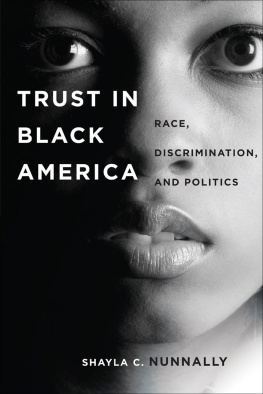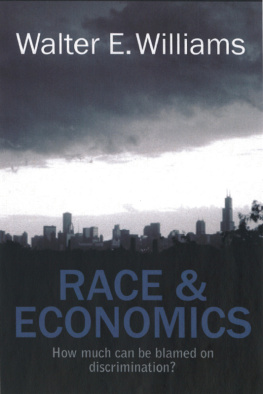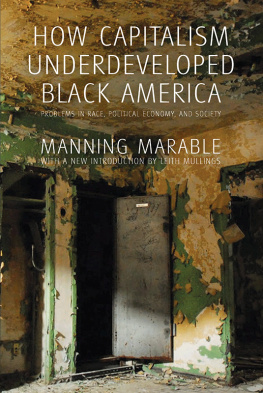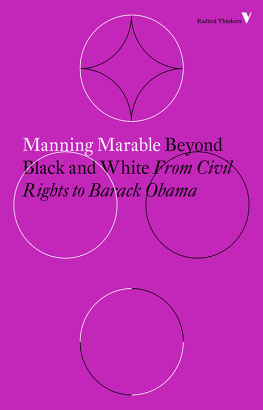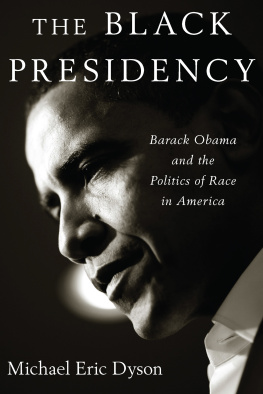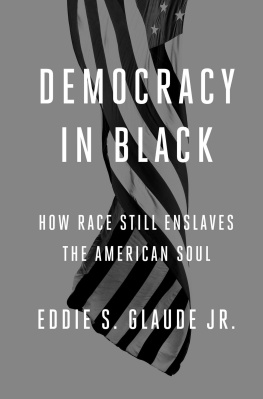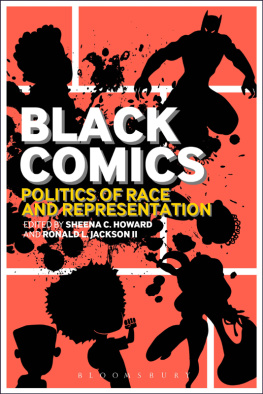NEW YORK UNIVERSITY PRESS
New York and London
www.nyupress.org
2012 by New York University
All rights reserved
References to Internet websites (URLs) were accurate at the time of writing. Neither the author nor New York University Press is responsible for URLs that may have expired or changed since the manuscript was prepared.
Library of Congress Cataloging-in-Publication Data
Nunnally, Shayla C.
Trust in Black America : race, discrimination, and politics / Shayla C. Nunnally.
p. cm.
Includes bibliographical references and index.
ISBN 978-0-8147-5865-6 (cl : alk. paper)ISBN 978-0-8147-5866-3 (pb : alk. paper)ISBN 978-0-8147-5930-1 (ebook)ISBN 978-0-8147-5931-8 (ebook)
1. African AmericansAttitudes. 2. African AmericansPsychology. 3. African AmericansSocialization. 4. TrustPolitical aspectsUnited States. 5. TrustSocial aspectsUnited States. 6. Political socializationUnited States. 7. United StatesRace relations. I. Title.
E185.615.N86 2011
305.896073dc23 2011028197
New York University Press books are printed on acid-free paper, and their binding materials are chosen for strength and durability. We strive to use environmentally responsible suppliers and materials to the greatest extent possible in publishing our books.
Manufactured in the United States of America
c 10 9 8 7 6 5 4 3 2 1
p 10 9 8 7 6 5 4 3 2 1
Preface and Acknowledgments
Having grown up in Petersburg, Virginia, I came to understand race easily. For my elementary and secondary education, I attended predominantly black public schools in the city. In a yesteryear, pre-1965, I would have attended an all-black, segregated school, but in the context of a city that had approximately an evenly split population between whites and blacks. Nevertheless, this racial context was different from the one in which I grew up. As the Petersburg City Public Schools integrated, many whites left the city, and by the time I attended school in the 1980s and 1990s, my school experience occurred in the context of a city population that had become predominantly black. The surrounding counties in the southeastern part of Virginia were either predominantly white or were more evenly split between a black and white population, and the schools mirrored this demography.
Although I had attended school in the same public school system as my father, my reality encompassed one in which I understood that my school represented a legacy of many southern public schools once segregation became unconstitutionalhyperconcentration of blacks in inner-city schools. As far as college, nevertheless, I made the conscientious decision to attend a historically black university to engage in a cultural and educational experience like the one I had in my formative years. It is in these contexts that I became exposed to diverse black perspectives and lifestyles that have informed the bases of my inquiries into race and trust in this book.
In the face of the world, my and other black students solidarizing experiences as black students in the South included facing the prejudice that came with attending school at predominantly black educational institutions. In college, especially, daily conversations among students could be heard about how to navigate leaving a predominantly black context and face the real world. Could we navigate the real world easily, or would we have trouble navigating the real world because we lived in isolated, black environments? It is through these experiences in these black institutional contexts that I also have gained some foreground and exposure to diverse messages about navigating race in ones daily life and possibly trusting through a racial lens, whether intraracially or interracially, to overcome the complexities of racial discrimination in racially insular and racially diverse communities.
Through a large faculty grant at the University of Connecticut, I have been able to field a national survey among blacks, whites, and Latinos in the United States. Therefore, I am grateful to the University of Connecticut and the Department of Political Science (Howard Reiter and Mark Boyer) and the Institute for African American Studies (Jeffrey Ogbar and Olu Oguibe) for offering additional monetary and resource support to help me field the survey. I also thank Jack Barry, Yazmin Garcia, Lin Li, Juhem Navarro, Chaka Uzondu, all current or former graduate students at the University of Connecticut, who assisted me with or chatted with me about my research, as I finished this project. Thank you, Destinee Chambers, for assisting me with revisions of my references. Very importantly, thank you to my executive editor at NYU Press, Ilene Kalish, for believing in the full scope of my project and being a most cordial and supportive editor during this process.
I wish to thank Niambi Carter, Victoria DeFrancesco-Soto, Melissa Harris-Perry, Monique Lyle, Monica McDermott, Chris Parker, Efren Perez, Howard Reiter, Evelyn Simien, Matthew Singer, Alvin Tillery, Heather Turcotte, and Keith Yancey, as they read various drafts of the manuscript or offered comments in different stages of the project. Very special thanks go to my graduate adviser and mentor, Paula McClain, who has shepherded my professional growth and who has been very supportive during my development of this project. Thank you to my mentor, Melissa Harris-Perry, who, along with Jarvis Hall, first introduced me to political science as a discipline of study in my undergraduate studies at North Carolina Central University (NCCU) and who encouraged me not to think of political science as merely a springboard for law school. To them, I am grateful for encouraging me to apply to graduate school in political science and, ultimately, for introducing me to my career. Especially, thank you Melissa, for encouraging me early in my studies to center black people in my political inquiries. I give special thank-yous to my former professors Joseph Aicher and the late Jeffrey Elliot, for supporting me as an undergraduate and encouraging me to strive toward the best in all that I did at NCCU and beyond. Thank you, Tyson King-Meadows, for believing in the tradition of Eagles soaring and encouraging me to do the same in the profession.
Thank you, Evelyn Simien, for all your continuing support and encouragement, as I navigate the profession. Special thanks go to Alvin Tillery, who, as another exceptional mentor, guided me through my dissertation writing and the writing culminating in the production of this book. Thank you Khalilah Brown-Dean, Melanye Price, and Robert Rusher for all your support, as I adjusted to New England. I wish to thank Nikol Alexander and Julia Jordan-Zachery, for your emotional support throughout my various revisions of this project. I also wish to thank a host of colleagues at the University of Connecticut for their continuing support and side chats, all of which made writing more creative and fun.
As well, I wish to thank several friends, who have laughed with me and at me, whenever I really needed to laughEverette Catilla, Andrea Chapman, Shirron Dobie, Jamorya Funderburk, Sataria Joyner, J. Alan Kendrick, Belinda Morrison, Maurice McNeil (and the McNeil family), Kenya Overton, Warren Richards, Farrand Violette, and Anisha Wilson. Thank you, as well, to a host of friends from Virginia, North Carolina, and Connecticut who have offered their support over the years. Most importantly, I wish to thank my mother, Gladys Nunnally, and my father, Sterling Nunnally, and other extended family members for their endless support. Through their love, guidance, and support of me charting my own path over the years, I have been driven to pursue my goals. To my ancestors, thank you for extending to me spirituality to build endurance during this effort.


